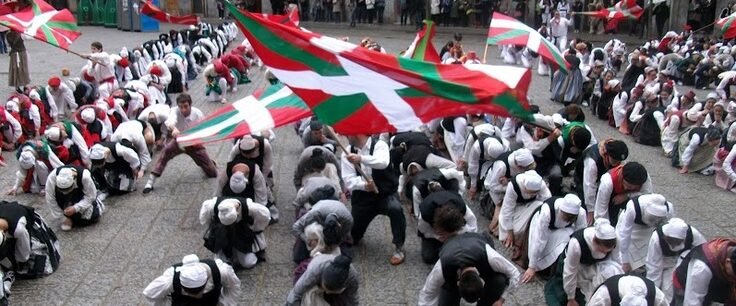A Glimpse into Basque Culture
Basque culture, seated in the picturesque regions of northern Spain and southwestern France, stands as one of the oldest and most distinctive cultures in Europe. Steeped in rich traditions and marked by a resilient identity, the Basque people, known as the Euskaldunak, have preserved their unique heritage through centuries of historical transformations. At the heart of this culture lies their enigmatic language, Euskara, which is unrelated to any other known language and remains a living testament to their ancient roots.
Folklore and traditional practices play a significant role in shaping Basque identity. Traditional sports such as pelota—a fast-paced ball game often played in local frontons—embody the community’s competitive spirit and communal pride. Culinary arts also hold a special place in Basque tradition, with pintxos, the sophisticated and elaborate tapas, being central to their gastronomic experiences. These small yet flavorful bites, often enjoyed with sips of the locally-produced txakoli wine, are a vivid representation of the region’s culinary innovation and dedication to quality.
Festivals and gatherings are intrinsic to Basque culture, with events like the Aste Nagusia in Bilbao drawing large crowds to celebrate with parades, fireworks, and a lively atmosphere. This week-long celebration reflects the community’s love for festivity and their ability to blend modernity with time-honored customs seamlessly.
The historical and cultural landscape of Bilbao itself achieves a remarkable balance between tradition and contemporary art, prominently symbolized by the Guggenheim Museum. This architectural marvel not only serves as a treasure trove of modern art but also stands as an emblem of the city’s dynamic evolution and the broader Basque capacity to embrace change while honoring their storied past.
Through a combination of age-old traditions and progressive transformations, Basque culture showcases its richness and resilience, offering an intricate mosaic that continues to fascinate and inspire. The enduring legacy of the Basque people is profoundly embedded in their daily practices, showcasing an admirable synthesis of historical heritage and modern vitality.
The Strength of Community: Basque People and Gatherings
At the core of Basque culture is an unwavering sense of community and togetherness, prominently showcased during various gatherings and celebrations. These events, ranging from intimate village festivals to grand region-wide festivities, are crucial to the Basque way of life. Central to these gatherings is the concept of ‘txokos,’ or Basque gastronomic societies. These social clubs provide a space where members can come together to prepare and share traditional meals, fostering camaraderie and preserving their rich culinary tradition.
Local festivals, or ‘jaiak,’ are joyous occasions that unite communities through music, dance, and traditional attire. Each village holds its own unique celebrations, highlighting the distinctive customs and histories of the region. During these events, traditional Basque dances, such as the lively ‘soka-dantza’ and the more solemn ‘aurresku,’ bring people together to celebrate their shared heritage. The music, often characterized by the use of the ‘txalaparta’ (a traditional percussion instrument), and the ‘trikitixa’ (a type of accordion), provides a vibrant backdrop to these communal gatherings.
Elaborate Basque weddings are another significant aspect of their social customs. These ceremonies are not just a union of two individuals but symbolize the merging of two families and their respective communities. The wedding rituals often feature traditional Basque music, dances, and a feast that showcases the region’s culinary delights. Such celebrations reinforce the importance of family ties and communal bonds within Basque society.
Moreover, the practice of ‘bertsolaritza,’ the Basque art of improvised singing, plays a pivotal role in preserving the linguistic and cultural heritage of the Basque people. Bertsos (the improvised verses) are often performed in public events and competitions, serving both as a form of entertainment and as a means of keeping the Basque language vibrant and relevant. These performances are a testament to the community’s creative spirit and its commitment to cultural preservation.
Overall, the Basque people’s social customs and gatherings are integral to their cultural identity, providing a sense of unity and continuity in a rapidly changing world. Through their festivals, gastronomic societies, weddings, and the cherished art of bertsolaritza, they maintain a strong communal bond that is both enduring and dynamic.



